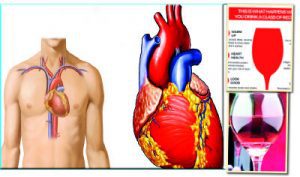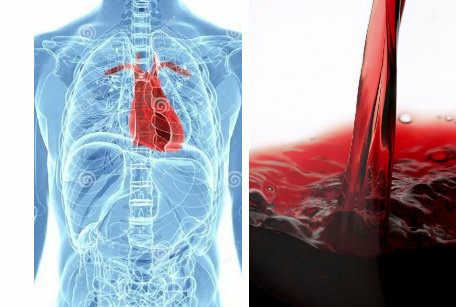People who generally do not consume alcoholic beverages are finding a very good reason to take occasional sips of red wine.
The bubbly red liquid made from berries contains a particular ingredient, resveratrol that has been found to be very good for the heart as it helps prevent damage to blood vessels, reduces low-density lipoprotein (LDL) cholesterol (the “bad” cholesterol) and prevents blood clots. But other studies found no benefits from resveratrol in preventing heart disease. To learn more about the other health benefits of red wine. Read on…

Which red wine is best for your heart?
Merlot, a medium-bodied wine, is made from blue-colored grapes. Red wines with more of a dry flavour profile, like cabernets, boast higher levels of flavonoids—an antioxidant that’s been shown to promote healthy cholesterol levels and help prevent coronary heart disease.
The online blog, Botswanayouths.com, in an article quoting a study done by Universidad Complutense de Madrid in Spain, stated that the high fibre in tempranillo red grapes used to make certain red wines, may actually have a significant effect on cholesterol levels.
Healthy study participants who consumed the same grape supplement found in red wine saw their LDL, or “bad cholesterol,” levels decrease by 9 per cent among healthy. Participants with high cholesterol experienced a drop of 12 per cent. What’s the big deal? Excess LDL ends up getting deposited in arterial walls and forming plaque, which causes arteries to stiffen and blood pressure to rise, ultimately leading to heart attacks.
What is it in red wine that is good for the heart?
Red wine and something in red wine called resveratrol might be heart healthy. The alcohol and certain substances in red wine called antioxidants may help prevent coronary artery disease, the condition that leads to heart attacks.
These antioxidants, especially resveratrol and proanthocyanidins, are believed to be responsible for the health benefits of red wine. Proanthocyanidins may reduce oxidative damage in the body. They may also help prevent heart disease and cancer. Resveratrol is found in grape skin.
On top of lowering bad cholesterol, polyphenols—the antioxidants in red wine—can help keep blood vessels flexible and reduce the risk of unwanted clotting, says John Folts, PhD, a professor of cardiovascular medicine and nutrition at the University of Wisconsin–Madison.
“They’re nearly as effective as aspirin,” says Folts. But be careful: chronic heavy drinking damages the heart, so, as with most things, moderation is key.
The resveratrol in red wine may also be the key to keeping the memory sharp, says Philippe Marambaud, PhD, a senior research scientist at New York’s Litwin-Zucker Research Center for the Study of Alzheimer’s Disease and Memory Disorders. The compound has been shown to hamper the formation of beta-amyloid protein, a key ingredient in the plaque found in the brains of people with Alzheimer’s.
Is a glass of red wine a day good for health?
Drink too much and you can damage your body, but in moderation — one glass a day for women and two a day for men — you might enjoy alcohol’s health benefits. If you prefer not to drink alcohol, the good news is that you can get the same health benefits from wine with significantly lower alcohol levels.
What is the healthiest type of wine?
Here is a look at the best red wines for your health:
Pinot Noir. Pinot Noirs grown in cool, wet climates have been found to contain the highest concentrations of resveratrol.
What kind of wine is good for you?
Red wines are the preferred type of wines in major winemaking countries such as Italy and France. The most popular red wines include Zinfandel, Cabernet Sauvignon, Merlot, Pinot Noir, Syrah, Malbec and Sangiovese. Both white and red wines are good for your health.
Can people with diabetes safely take red wine?
The skin of red grapes—a rich natural source of resveratrol, the main ingredient in red wine may actually help diabetics regulate their blood sugar, according to s recent research published in the journal Nutrition. Study participants who took a 250 mg resveratrol supplement once a day for three months had lower blood glucose levels than those who didn’t take the pill. Plus, resveratrol-takers also had significant decreases in total cholesterol and systolic blood pressure. Researchers suspect that resveratrol may help stimulate insulin secretion or activate a protein that helps regulate glucose and insulin sensitivity.
What is the difference between red and white wine?
The biggest difference between reds and whites is in how they’re made. The grapes used for red and white wines generally look very different—as you might imagine, red wine grapes are darker and have more pigment. When making white wine, typically the grapes are pressed and then just the juice is fermented.




Discussion about this post